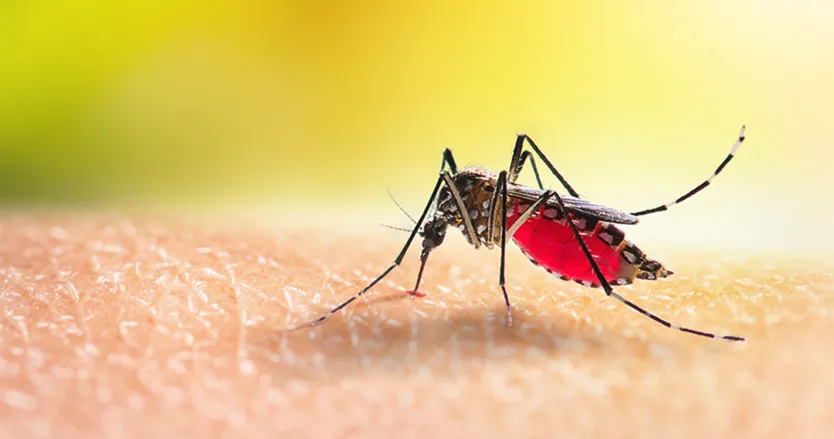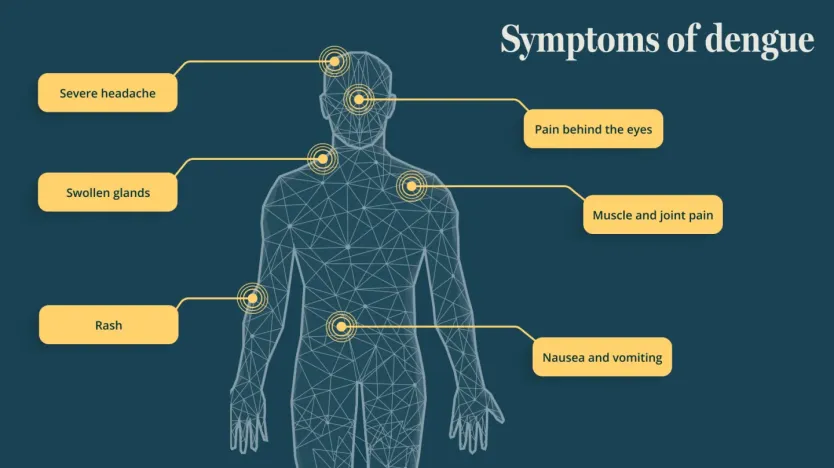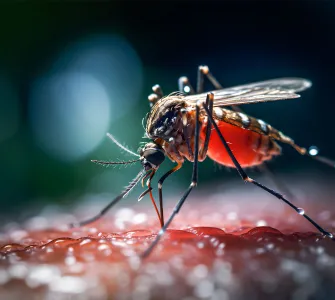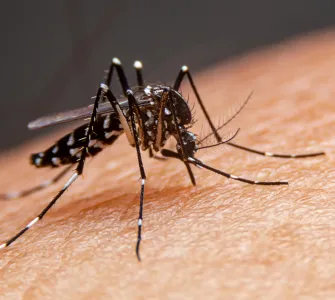How well do you know the symptoms of dengue?


Dengue is a major health threat to humans around the world; various countries have recently reported their worst outbreaks on record.1-4 As dengue continues to spread to new areas (including in Europe),1 knowing its symptoms can be helpful when it comes to spotting this disease. Let’s consider the symptoms of dengue below.
Not everyone who gets dengue experiences symptoms
Most cases of dengue do not cause symptoms (1 in 4 dengue infections are symptomatic).1,5 For people who do experience them, symptoms can be mild, like a fever or headache.1 But, about 1 in 20 of those who experience symptoms can progress to dengue’s more serious form, called severe dengue.5 In these cases, symptoms can become life-threatening, like bleeding, organ failure and, in rare cases, death.6 You can read more about severe dengue, including who might be at risk of developing it, in the Severity section of this site.
The symptoms of dengue don’t start straightaway
Dengue symptoms take time to develop after an infection.1 This is because, after a person is infected, the dengue virus needs to replicate in the body (called the incubation phase).7 Once symptoms have developed, the disease progresses through a series of phases with the illness ending in most people during the recovery phase.5
Symptoms of dengue
Symptoms of dengue can overlap with some other diseases, making it difficult to diagnose.8 However, the reason dengue is also called ‘breakbone fever’ is because its symptoms can include muscle and joint pain which can sometimes be severe.1,9

Severe dengue is a medical emergency that can be fatal if untreated5,6
What is getting dengue really like? Click here to watch some real-life dengue patient stories.
Bear in mind, the nature of dengue means that individual experiences and symptoms of this disease will vary.
Deal with dengue early: spot the symptoms and act fast
Spotting dengue quickly can help you and your doctor manage it earlier and – in cases of severe dengue – may help save your life.10
The dengue residue
While most people recover from dengue in 1-2 weeks, some can continue to experience symptoms well beyond this point.11-13 These symptoms may include fatigue, depression, weakness, and weight loss.11,12 Consult your doctor, if you continue to experience symptoms like these for some time after your infection.
A quick note about dengue symptoms in travelers
Dengue is spreading to more destinations and cases are increasing among travelers.1,14 You may want to check for any reports of dengue at your destination, even if it has previously been ‘dengue-free’. Remember, as dengue symptoms can occur some time after infection, you should remain vigilant both during your trip and after you return home.1,15 Aside from being alert to dengue symptoms, you could see your doctor for a health check-up and discuss preventative measures and treatments for dengue if you are planning to travel to an area where this disease is endemic.
Being aware of dengue symptoms as well as of measures to help protect against it are vital. Protective measures such as using insect repellents, mosquito nets and vaccinations can all be helpful if you are living in or traveling to, a dengue endemic area.1,16 You can find out more about preventing and protecting against dengue in our article here.
References
World Health Organization. Available at https://www.who.int/news-room/fact-sheets/detail/dengue-and-severe-dengue Accessed January 2024.
Reuters. Available at: https://www.reuters.com/business/healthcare-pharmaceuticals/bangladesh-dengue-deaths-top-1000-worst-outbreak-2023-10-02/ Accessed January 2024.
BMJ. Available at: https://www.bmj.com/content/381/bmj.p1431. Accessed January 2024.
Bijukchhe SM, et al. J Travel Med. 2023:taad112.
Centers for Disease Control and Prevention. Available at: https://www.cdc.gov/dengue/hcp/clinical-signs Accessed January 2024.
Mayo Clinic. Available at: https://www.mayoclinic.org/diseases-conditions/dengue-fever/symptoms-causes/syc-20353078 Accessed January 2024.
Centers for Disease Control and Prevention. https://wwwnc.cdc.gov/travel/yellowbook/2024/infections-diseases/dengue. Accessed January 2024.
Santos CY, et al. Heliyon. 2023;9(6):e16634.
Shastri PS, et al. Indian J Crit Care Med. 2021;25(Suppl 2):S130-S133.
Arshad H, et al. Cureus. 2022;14(7):e26677.
Tiga DC, et al. Am J Trop Med Hyg. 2016;94(5):1085-1089.
Teixeira LAS, et al. Rev Inst Med Trop Sao Paulo. 2017;59:e65.
Kalimuddin S, et al. PLoS Negl Trop Dis. 2022;16(8):e0010724.
Tozan Y, et al. Am J Trop Med Hyg. 2019;100(6):1525-1533.
Herman J, et al. Medicine (Abingdon). 2018;46(1):59-65.
European medicines agency Available at: https://www.ema.europa.eu/en/news/new-vaccine-protect-people-eu-worldwide-against-dengue Accessed November 2023.































